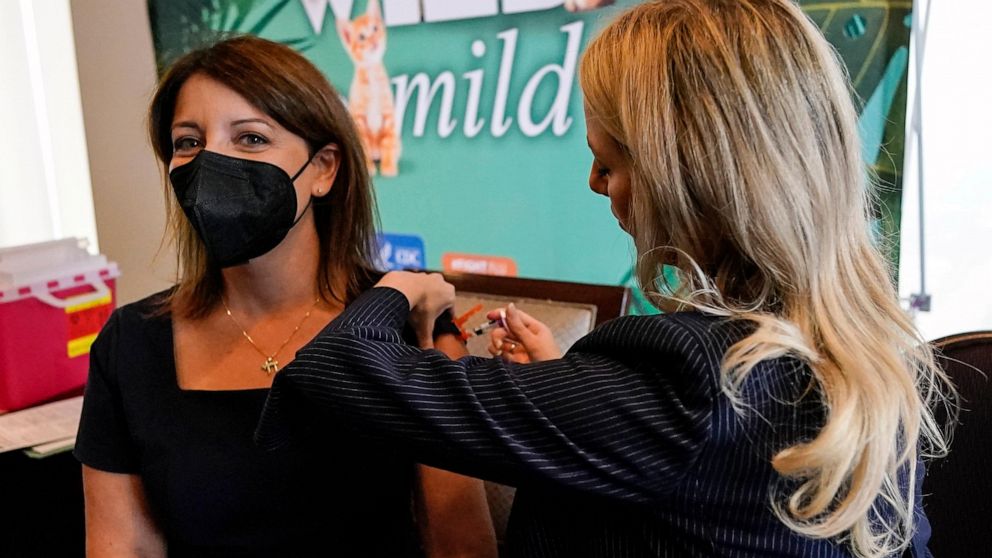WASHINGTON — The latest vaccines for coronavirus disease (COVID-19) are coming soon, just in time to be paired with the flu shot. And this fall, the first vaccines against another deadly virus called RSV will be rolled out to older people and pregnant women.
Although not as high as this time last year, the number of COVID-19 hospitalizations has been steadily increasing since late summer, and RSV infections are already on the rise in parts of the Southeast.
The latest COVID-19 vaccinations are expected to be approved within days. These are among the tools the new director of the Centers for Disease Control and Prevention says will help put the U.S. in its “strongest position ever” to avoid another disruptive respiratory season. .
“We’re going to see a lot of virus outbreaks this winter. That’s why we want to get ahead of it,” said CDC Director Dr. Mandy Cohen.
Here’s what you need to know about fall vaccinations.
Why do we need more COVID-19 vaccinations?
The ever-evolving coronavirus will never go away. Just as the flu shot is updated every year, the Food and Drug Administration gave COVID-19 vaccine makers a new recipe this fall.
The updated shot includes a single target that is an omicron descendant named XBB.1.5. That’s a big change. The COVID-19 vaccines that have been available since last year are combination vaccines that target the original coronavirus strain and a much earlier Omicron version, making them highly outdated.
Pfizer, Moderna and Novavax have all started new supplies.
The FDA will soon determine whether each company meets safety, efficacy, and quality standards. The CDC must then approve it before vaccinations can begin. A CDC advisory committee is scheduled to meet Tuesday to make recommendations on how best to use the latest shot.
Earlier this month, European regulators approved Pfizer’s latest vaccine for adults and children as young as six months old this fall.
Are they effective enough?
Health officials remain optimistic unless new variants emerge.
As expected, XBB.1.5 disappeared within the months it took for the vaccine to be fine-tuned. There are currently a variety of coronavirus variants that cause disease, the most common of which are fairly close relatives. Recent lab tests by vaccine makers and other research groups suggest the updated shots offer crossover protection.
Previous vaccinations and infections have continued to help prevent severe illness and death, but protection against particularly mild infections will wane over time as the virus continues to evolve. . Most Americans haven’t been vaccinated in about a year, although the FDA cleared older adults and high-risk people to receive additional booster shots last spring.
“The best thing people can do to maintain a normal lifestyle is to continue to get booster shots,” said David Montefiori, a vaccine expert at Duke University.
Who also needs the influenza vaccine?
The CDC urges almost everyone 6 months of age and older to get a flu shot every year. The best time is until the end of October.
Like COVID-19, influenza can be especially dangerous for certain groups, such as the very young, the elderly, and people with weakened immune systems and lung or heart disease.
There are multiple types of influenza vaccines, including a nasal spray type for some young people. More importantly, he has three shots to choose from, which are especially recommended for the elderly, as they have been proven to be highly effective in activating their immune systems.
Can I get a flu shot and a COVID-19 vaccination at the same time?
yes.
The CDC says there is no difference in efficacy or side effects if these vaccines are given together, but it may be more comfortable to have one in each arm.
What is this new respiratory syncytial virus vaccine?
Respiratory syncytial virus (RSV) is a nuisance like a cold to most people, but it’s not as well known as the flu. But RSV floods hospitals every winter and can be deadly for children under 5, the elderly and people with certain high-risk health problems. It is best known for inflaming babies’ small airways and causing wheezing, but it is also a common cause of pneumonia in older adults.
The GSK and Pfizer RSV vaccines have been approved for adults aged 60 and older. The CDC advises older adults to ask their doctors if they need one dose.
The FDA also approved Pfizer’s RSV vaccine to be given late in pregnancy so mothers-to-be can pass on its protection to their newborns. Her CDC recommendations on its use are expected later this month.
Advice on whether the RSV vaccine should be given along with influenza and COVID-19 vaccinations is also forthcoming.
What about babies and RSV?
There’s another new shot parents might hear this fall. It’s an injection of lab-made antibodies to protect babies from respiratory syncytial virus.
This is different from a vaccine, which teaches the body to make its own antibodies to fight infection, but it is just as protective.
The FDA recently approved Sanofi and AstraZeneca’s Bayfortus. This single-dose drug is recommended for all infants under the age of 8 months before their first RSV season.
___
Associated Press Medical Writer Carla K. Johnson contributed to this report.
___
The Associated Press Health and Science Department receives support from the Howard Hughes Medical Institute’s Science and Education Media Group. AP is solely responsible for all content.

